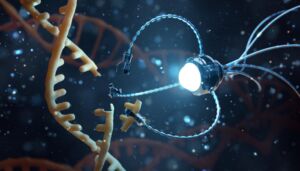Gene variants are of several kinds depending on where they (gene change) occur and if they alter the function of essential proteins.
Variant types include:
- Substitution: This is a type of mutation, where one nucleotide (DNA building block) is replaced by a different nucleotide. This term can also be referred to the replacement of one amino acid in a protein with a different amino acid. It is further classified into two types: Missense and Nonsense.
- Insertion: In insertion, one or more extra nucleotides are inserted to the gene thereby making a change to the DNA sequence. As a result, the protein made from the gene may not function appropriately.
- Deletion: A deletion changes the DNA sequence by removing at least one nucleotide in a gene. Small deletions remove one or more nucleotides from within a gene, while larger deletions can remove an entire gene or sometimes several neighbouring genes. The deleted DNA may affect the protein function.
- Deletion-Insertion: This type of mutation occurs, when both deletion and insertion occur simultaneously at the same site of the gene. In the deletion-insertion variant, at least one nucleotide is removed and at least one nucleotide is inserted. However, the change is complex and not a mere substitution. The deletion-insertion (delins) variant is also known as insertion-deletion (indel) variant.
- Duplication: A duplication variant occurs when at a single time, one or more nucleotides in a gene are copied and repeated next to the original DNA sequence.
- Inversion: This type of variant occurs when more than one nucleotide is changed within the gene by replacing the original sequence in reverse order.
- Frameshift: In general, a frame consists of groups of three nucleotides that each code for one amino acid, which makes the proteins. When a frameshift variant occurs, there is either addition or loss of nucleotides that shifts the grouping and changes the code for all subsequent amino acids. The resulting protein is usually nonfunctional. The above-mentioned insertions, deletions, and duplications can be frameshift variants.
- Repeat expansion: Some areas of DNA contain short sequences of nucleotides that are repeated a number of times in a row. A repeat expansion variant is that when there is an increase in the number of times the short DNA sequence is repeated




